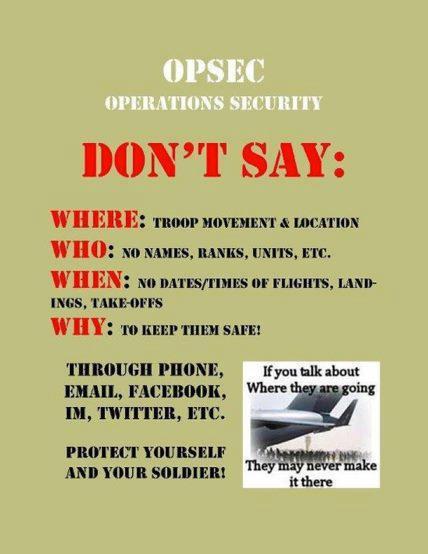All personnel (including families and friends of service members) have a responsibility to ensure that no information that might put our military members in jeopardy or would be of use to our adversaries is posted to websites that are readily accessible to the public. Not surprisingly, that information includes, among other things, technical information, operation plans, troop movement schedules, current and future locations of military units and ships, descriptions of overseas bases, details of weapons system, or discussions of areas frequented by service members overseas. Other information that’s not as obvious but should also not be discussed in an open forum includes daily military activities and operations, equipment status, unit morale, and results of operations. Any of these topics, if released in an open medium, have the ability to provide our adversaries opportunities to harm our military members.
OPSEC Rules
1. Do not post exact deployment dates or redeployment dates
2. Do not reveal camp locations, including nearby cities. After the deployment is officially announced by Military officials, you may discuss locations that have been released, normally on the Country level.
3. Do not discuss convoy routes (“we travelled through Takrit on our way to X”)
Detailed information on the mission, capabilities or morale of a unit
Specific names or actual nicknames
4. Personnel transactions that occur in large numbers (Example: pay information, powers of attorney, wills, etc)
5. Details concerning security procedures, response times, tactics
6. Don’t discuss equipment or lack thereof, to include training equipment
7. Don’t speculate about future operations
8. If posting pictures, don’t post anything that could be misconstrued or used for propaganda purposes. A good rule of thumb is to look at your picture without your caption or explanation and consider if it could be re-captioned to reflect poorly on coalition forces. For example, your image might show your Soldier rescuing a child from a blast site, but could be re-captioned to insinuate that the child being captured or harmed. (it’s happened!)
9. Avoid the use of count-up or count-down tickers for the same reason as rule #1
10. Be very careful if posting pictures of your loved one. Avoid images that show significant landmarks near their base of operations, and black out last names and unit affiliations
11. Do not, ever, post information about casualties (coalition or enemy) before the official release of the information.
12. Do not pass on rumors (“I heard they’re coming home early”, etc)
If you have any questions, contact your (or your sponsor’s) unit OPSEC manager.
These OPSEC rules aren’t meant to limit your free speech or restrict your liberties- that’s exactly what our Men and Women in uniform fight to protect. However, they are designed to help ensure the safety and security of the Service Members in your life.
Remember, no matter your affiliation, status, rank or age- you have a part in the security of your loved one!
PERSEC stands for: Personnel Security System (US Department of Homeland Security)
And that brings us to PERSEC or Personal Security. This is protecting your personal information. While the military is not as strict on PERSEC as they are on OPSEC, it is still an important aspect of security.
PERSEC focuses on protecting information such as rank, your home address and information about your family. Generally, it is basic common sense that reminds you not to advertise that you are living alone or otherwise giving out personal information to others who you may not know.
PERSEC has become more important with the invention of the internet, particularly with the number of military support message boards that are out there. While it may seem to be a safe community full of other military members, it can never be guaranteed to be 100% secure. For this reason, you should always safeguard your personal information. Just as you wouldn’t advertise your social security number online, you shouldn’t alert everyone to your other personal information either.
If you ever have questions about OPSEC and PERSEC and how it applies to you, you can always contact the family readiness group for guidance. If they are unable to answer your questions, they should be able to refer you to someone in the unit who can find the answers for you.
The absolute best advice is that it is better to be safe than sorry. If you question whether you should be talking about something, especially online, then don’t. Ask someone first, such as your soldier, before you say something that you may not be able to take back. Protecting our soldiers is a responsibility that rests on all of our shoulders. As family members, we can be responsible by keeping confidential information close to the vest and protecting what we know.



